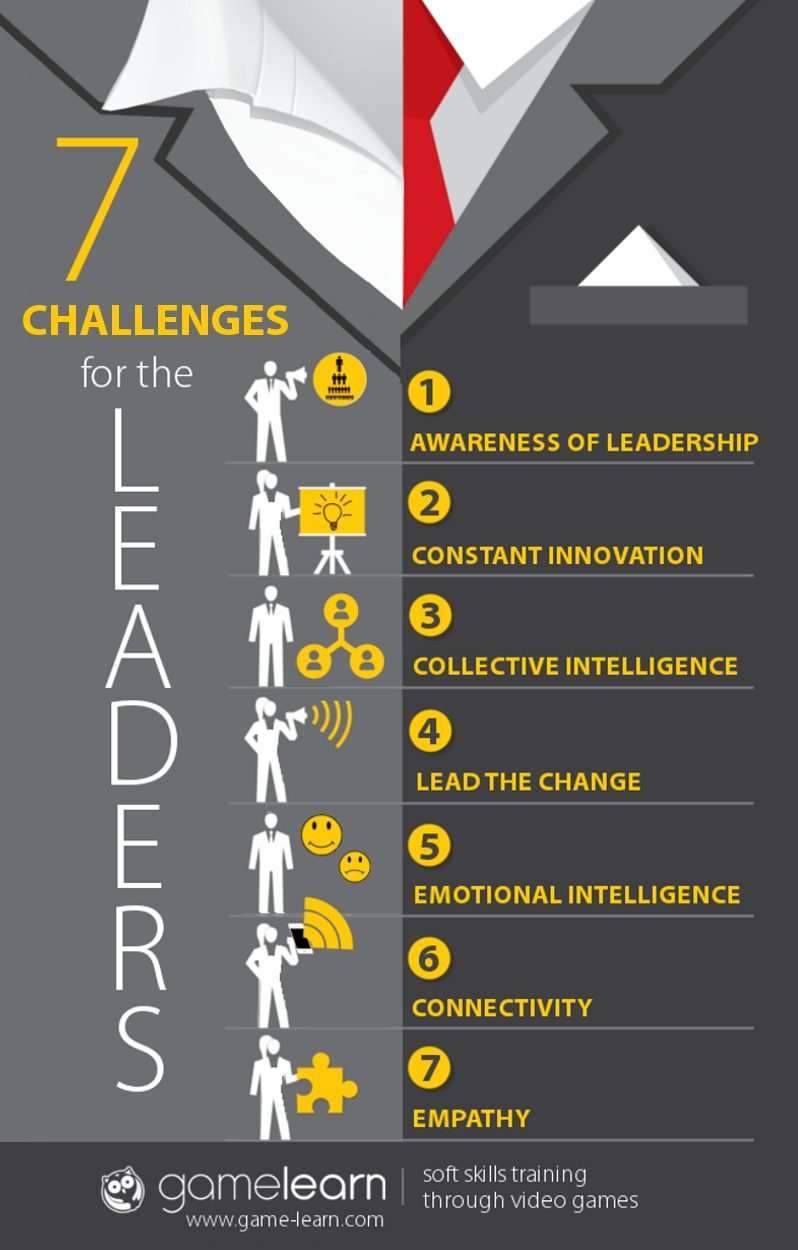The great challenges of tomorrow include acquiring and developing a certain range of skills and abilities. It is fairly obvious that we are living in a constantly changing world, increasingly dynamic and challenging. This complexity also affects the business environment, which never stops evolving.
Organizations in the XXI century have a need of leaders capable of adapting to these changes, able to keep the ship afloat despite all those continuous changes of course.
We have gathered the seven most important challenges for the leaders of tomorrow:
1. Awareness of leadership
In recent years, leadership has caught the attention of expert sociologists and managers of big companies. Nearly all of them agree on the positive effects good leaders have had on the efficiency of organizations. Without awareness of leadership, it is, and will be, much more difficult to achieve any success at all.
The organizations of the future will require that leaders be trained to be leaders, that is, people who are really, actually prepared to lead. The real challenge is to develop those personal skills consciously (leading the change, innovation and creativity, working in a team, having the ability to apply knowledge to decision-making, communicating, etc.).
The leaders of tomorrow will know they are one, they will stop to have a new look at their goals before going after them, and they will count on their team and be surrounded by the most capable people to achieve the goal. In short, the challenge will be to watch and develop leadership.
It may interest you: 10 qualities of a good leader
2. Constant innovation
Innovation is a key factor in the success of any business. The demands in competitiveness faced by any company, whether in the present or in the future, are just huge. We are living in an unpredictable environment, and that requires quick reactions.
The good news is that we are also living in a scenario which is favorable to encouraging creativity, with an increasing accessibility and many tools to motivate innovation with. Leading requires giving great importance to innovation in any field and understanding that the real risk lies in not innovating.
Leaders will effectively get everyone in the organization, from executives to employees, involved in developing an environment of innovation where creativity is rewarded.
It may interest you: The gamification promotes innovation in companies
3. Collective intelligence
Nowadays, most organizations are based on vertical structures where not everyone can cooperate in the same way. The trend is to gradually implement a more horizontal model, based on collaboration. With the development of new information technologies, especially on the Internet, collective intelligence will become stronger and stronger.
The leadership of tomorrow will become increasingly aimed towards the enhancement of that collective intelligence. It will be in the leader’s hands to prevent the group from being just a “mass” and, on the contrary, to make it behave efficiently and intelligently. Thus, more people will be involved in the decision-making processes and leadership will encourage that change.
4. Metamorphosis. Leading the change
The functions of planning, analyzing and controlling, done by the leader over the rest of the group, have traditionally been given great importance. But precisely because of the ongoing change that we said we are facing, these responsibilities will become less and less indispensable, as the leader cannot effectively control such an unpredictable environment.
Therefore, the ability to adapt to change will become increasingly valuable and successful leadership will be supported by the ability of transformation. In addition to that, leaders will move with more frequency between different cultures and business models, so they will need to show flexibility and adaptability. The leader of the future is destined to be the driving force for change.
5. Emotional Intelligence and Soft Skills
Social skills or “soft skills” will be regarded (as a matter of fact, they already are) as one of the most demanded types of skill. These skills are the ones needed to persuade, influence and convince others in order to achieve goals.
Leadership will categorically require these skills, and their mastering will result in a great asset for the company. The leader of the XXI century must stand as a ‘social influencer’ on their environment. One of the top priorities of the company of the XXI century will be to understand and watch the communication process within and outside the organization itself.
6. Connectivity
Since we are living in the age of communication, the connections between companies, institutions and individuals are, and will keep, growing on and on. The use of technological devices (Internet, social networks, audiovisual products, etc.) has had a positive impact on productivity as well as on job satisfaction.
Leadership will make use of these connections to improve production processes and gain competitive advantage. The ability to stay “connected” will be central to the survival of organizations and the optimization of businesses. Social networking will become part of the DNA of any company.
Therefore, the leaders of tomorrow will need to ensure this connectivity to guarantee immediate access to their teams anytime, anywhere, always assuring the proper safety and integration needed for it to be truly efficient.
7. Empathy
The leader of the future must be a mentor. One of the great challenges of tomorrow is to train leaders who can build up trust and show empathy toward others, inside and outside their own organization.
In order to share a viewpoint and try to achieve a common goal, successful leadership should appeal to emotions and become a source of motivation.
To that purpose, it will be necessary to show respect to others, as well as empathy and the defense of those ideals which have previously achieved group identification.
It may interest you: Ethical leaders as driving force for efficiency in business





